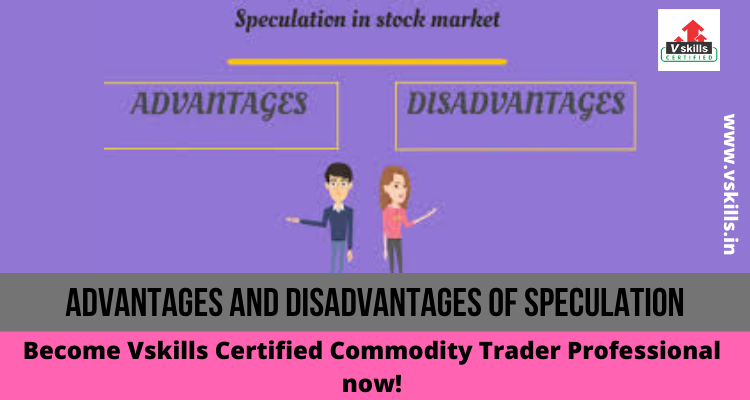Learn more about the advantages and disadvantages of speculation.
Advantages of Speculating
- Sustainable consumption level:
- Let’s consider some of the principles that explain the causes of shortages and surpluses and the role of speculators. When a harvest is too small to satisfy consumption at its normal rate, speculators come in, hoping to profit from the scarcity by buying.
- Their purchases raise the price, thereby checking consumption so that the smaller supply will last longer. Producers encouraged by the high price further lessen the shortage by growing or importing to reduce the shortage.
- On the other side, when the price is higher than the speculators think the facts warrant, they sell. This reduces prices, encouraging consumption and exports and helping to reduce the surplus.
- Another service provided by speculators to a market is that by risking their own capital in the hope of profit, they add liquidity to the market and make it easier or even possible for others to offset risk, including those who may be classified as hedgers and arbitrageurs.
- Market liquidity and efficiency:
- Without speculators, only producers and consumers would participate in that market. With fewer players in the market, there would be a larger spread between the current bid and ask price of commodities. Any new entrant in the market who wanted to trade in commodities would be forced to accept an illiquid market, would enter the market with large difference in the bid price and ask price or may not find any counterparties at all.
- A commodity speculator may exploit the difference and reduce the spread through competition with other speculators. Some argue that speculators increase the liquidity in a market, and therefore promote an efficient market, while others say that, as more and more speculators participate in a market, underlying real demand and supply can become diminishingly small compared to trading volume, and prices can become distorted.
- Bearing risks:
- For instance, a farmer might be considering planting cotton on some unused farmland. But he might not want to do so because he is concerned that the price might fall too far by harvest time. By selling his crop in advance at a fixed price to a speculator, the farmer can hedge the price risk and is now willing to plant the corn. Thus, speculators can actually increase production through their willingness to take on risk.
- Finding environmental and other risks:
- Hedge funds that do “fundamental analysis “are far more likely than other investors to try to identify a firm’s “off-balance-sheet exposures”, including “environmental or social liabilities present in a market or company but not explicitly accounted for in traditional numeric valuation or mainstream investor analysis”, and hence make the prices better reflect the true quality of operation of the firms.
- Shorting
- Shorting may act as a means to stop unsustainable practices earlier and thus reduce damages and forming market bubbles.
Disadvantages of Speculation
- Winner’s Curse:
- Auctions are a method of squeezing out speculators from a transaction, but they may have their own perverse effects. The winner’s curse says that in an auction, the winner will tend to overpay in one of two ways:
- The winning bid exceeds the value of the auctioned asset such that the winner is worse off in absolute terms; or
- The value of the asset is less than the bidder anticipated, so the bidder may still have a net gain but will be worse off than anticipated.
- The winner’s curse is not very significant to markets with high liquidity for both buyers and sellers, as the auction for selling the product and the auction for buying the product occur simultaneously, and the two prices are separated only by a relatively small spread. This mechanism prevents the winner’s curse phenomenon from causing mispricing to any degree greater than the spread.
- Economic Bubbles:
- Speculation is often associated with economic bubbles. A bubble occurs when the price for an asset exceeds its intrinsic value by a significant margin. Speculative bubbles are characterized by rapid market expansion driven by word-of-mouth as initial rises in commodity price attract new buyers and generate further inflation. Speculative bubbles are essentially social epidemics whose contagion is mediated by the structure of the market.
- Volatility
- For a speculator, a good performance would occur when there is a very high level of volatility. It is a controversial point whether the presence of speculators increases or decreases the short-term volatility in a market. Their provision of capital and information may help stabilize prices closer to their true values. On the other hand, crowd behaviour and positive feedback loops in market participants may also increase volatility at times.



